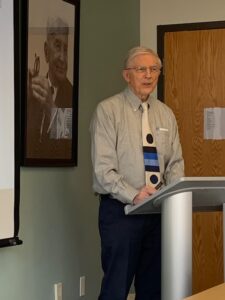Perhaps history’s greatest teacher of principles of microeconomics (“Econ 101”) is the University of Virginia’s Kenneth Elzinga. Still going strong at the age of 81, Ken, in addition, is one of the world’s leading and best economic experts on antitrust – meaning that he understands that antitrust is far too often used to stymie, rather than to promote, competition.
Ken is also the co-author, along with the late Bill Breit, of the series of economic murder mysteries published under the nom de plume Marshall Jevons.
The fates, treating me much more generously than I deserve, forged between Ken and me a friendship in the mid-1980s. I’m grateful beyond words that this friendship continues to thrive. Ken is – like Bruce Yandle, and the late Hugh Macaulay, Manuel Ayau, Julian Simon, Andrea Rich, Leland Yeager, and Walter Williams – one of the most remarkable people I have ever known and befriended.
 Ken spoke today (pictured here) in Fairfax at the GMU – Mercatus Center weekly seminar run by my colleague Pete Boettke. The seminar room was standing-room-only, filled mostly with GMU Econ students who not only will retain for their lifetimes much of the wisdom they encountered today, but also will share this wisdom with the students they will teach in the years and decades to come.
Ken spoke today (pictured here) in Fairfax at the GMU – Mercatus Center weekly seminar run by my colleague Pete Boettke. The seminar room was standing-room-only, filled mostly with GMU Econ students who not only will retain for their lifetimes much of the wisdom they encountered today, but also will share this wisdom with the students they will teach in the years and decades to come.
Ken’s lecture was an insightful contemplation of the connection of capitalism with democracy. Unsurprisingly, Ken argued, very convincingly, that the market – in which even the lowliest person possesses the right to say “no” – out-performs government schemes to improve the lot of ordinary people.



